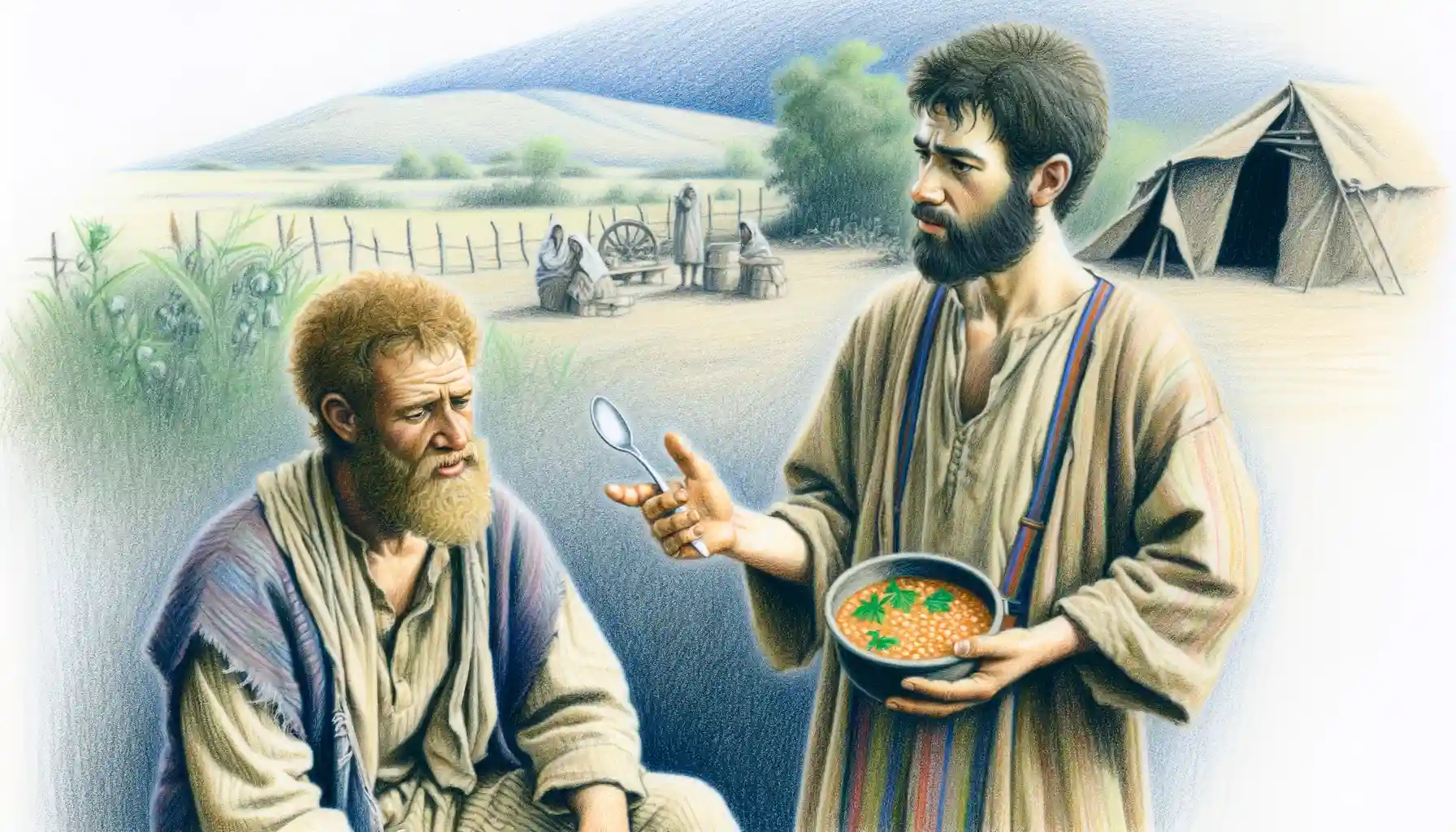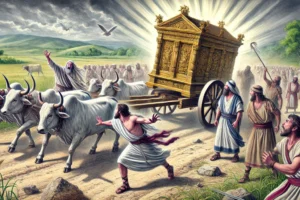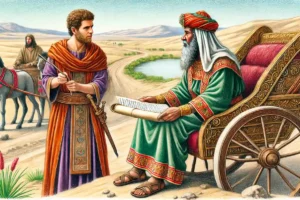
Esau Sells His Birthright
The story of Esau selling his birthright is a pivotal moment in the Book of Genesis, highlighting themes of impulsivity, value, and destiny. This brief yet profound event sets the stage for significant developments in the lineage of Israel.
Quick Facts
- Characters: Esau and Jacob are twin brothers, sons of Isaac and Rebekah.
- Birthright Definition: In biblical times, the birthright (bekorah) was the special inheritance rights of the firstborn son, including a double portion of the family estate and the leadership of the family.
- Esau’s Decision: Famished after a hunting trip, Esau agreed to trade his birthright to Jacob for a bowl of lentil stew.
- Scriptural Reference: This event is recorded in Genesis 25:29-34.
- Significance: This transaction had significant implications for the fulfillment of God’s promises and the future of Israel, as Jacob became the heir of the Abrahamic covenant.
The story of Esau selling his birthright is found in Genesis 25:29-34. Esau and Jacob, the twin sons of Isaac and Rebekah, were born after a divine promise to their parents. From the beginning, their destinies were intertwined with prophecy: “Two nations are in your womb, and two peoples from within you will be separated; one people will be stronger than the other, and the older will serve the younger” (Genesis 25:23). This prophecy set the stage for the significant events that would follow, including the exchange of the birthright.
The Birthright: Its Importance
In the ancient Near Eastern culture, the birthright (bekorah) held immense significance. It granted the firstborn son a double portion of the family inheritance and the position of family leadership. More importantly, in the context of the Abrahamic covenant, it included spiritual blessings and the promise of being part of God’s chosen lineage. Esau, as the firstborn, stood to inherit not only material wealth but also the fulfillment of God’s promises made to Abraham and Isaac.
Esau’s Decision
Esau’s decision to sell his birthright is recorded during a seemingly ordinary day. Returning from the field exhausted and famished, he encounters Jacob cooking a pot of lentil stew. Driven by immediate hunger, Esau impulsively asks for some of the stew. Jacob, recognizing an opportunity, demands Esau’s birthright in exchange. Esau’s response, “Look, I am about to die; what good is the birthright to me?” (Genesis 25:32), reveals his shortsightedness and lack of appreciation for the long-term value of his inheritance.
This impulsive decision showcases Esau’s character—a man driven by physical desires and immediate needs, rather than spiritual values and long-term considerations. His choice to prioritize temporary satisfaction over eternal blessings has been viewed by theologians as a profound moral and spiritual failure.
Jacob’s Intentions
Jacob’s actions, while opportunistic, also reflect his recognition of the birthright’s significance. Unlike Esau, Jacob valued the birthright and the spiritual responsibilities it entailed. This transaction aligns with God’s earlier declaration that the older would serve the younger. Though Jacob’s method of obtaining the birthright can be criticized for its cunning nature, his desire to fulfill God’s plan is evident.
Theological Implications
The exchange of the birthright between Esau and Jacob is rich with theological implications. It highlights the concept of God’s sovereignty and the unexpected ways in which He fulfills His promises. Despite human actions and flaws, God’s plan prevails. This event foreshadows Jacob’s future as Israel, the father of the twelve tribes, and the bearer of the covenantal promises.
Esau’s decision also serves as a warning against undervaluing spiritual heritage. Hebrews 12:16-17 reflects on this event, admonishing believers to avoid being “godless like Esau, who for a single meal sold his inheritance rights as the oldest son.” Esau’s loss of the birthright due to his lack of spiritual insight contrasts sharply with Jacob’s determined pursuit of God’s blessings.
Legacy and Consequences
The consequences of this transaction were far-reaching. Jacob would go on to deceive Isaac and receive the paternal blessing meant for Esau, further cementing his role in the divine plan. Esau’s descendants, the Edomites, would become a nation often at odds with Israel. The story of Esau and Jacob underscores the lasting impact of choices and the importance of valuing God’s gifts and promises.
Conclusion
The narrative of Esau selling his birthright to Jacob is a complex and instructive tale. It reveals the dangers of impulsivity and the necessity of valuing spiritual over material blessings. This story not only illustrates individual character traits but also emphasizes the overarching sovereignty of God in the unfolding of His divine plan. The lessons from Esau’s and Jacob’s actions continue to resonate, reminding us to consider the long-term significance of our choices and the eternal value of God’s promises.



